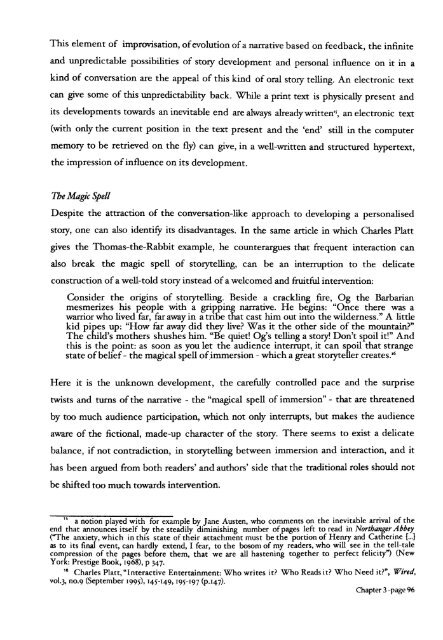From Page to Screen - WRAP: Warwick Research Archive Portal ...
From Page to Screen - WRAP: Warwick Research Archive Portal ...
From Page to Screen - WRAP: Warwick Research Archive Portal ...
Create successful ePaper yourself
Turn your PDF publications into a flip-book with our unique Google optimized e-Paper software.
This element of improvisation, ofevolution ofa narrative based on feedback, the infinite<br />
and unpredictable possibilities of s<strong>to</strong>ry development and personal influence on it in a<br />
kind of conversation are the appeal of this kind of oral s<strong>to</strong>ry telling. An electronic text<br />
can give some of this unpredictability back. While a print text is physically present and<br />
its developments <strong>to</strong>wards an inevitable end are always already written'', an electronic text<br />
(with only the current position in the text present and the 'end' still in the computer<br />
memory <strong>to</strong> be retrieved on the fly) can give, in a well-written and structured hypertext,<br />
the impression ofinfluence on its development.<br />
The Magic Spell<br />
Despite the attraction of the conversation-like approach <strong>to</strong> developing a personalised<br />
s<strong>to</strong>ry, one can also identify its disadvantages. In the same article in which Charles Platt<br />
gives the Thomas-the-Rabbit example, he counterargues that frequent interaction can<br />
also break the magic spell of s<strong>to</strong>rytelling, can be an interruption <strong>to</strong> the delicate<br />
construction ofa well-<strong>to</strong>ld s<strong>to</strong>ry instead ofa welcomed and fruitful intervention:<br />
Consider the origins of s<strong>to</strong>rytelling. Beside a crackling fire, Og the Barbarian<br />
mesmerizes his people with a gripping narrative. He begins: "Once there was a<br />
warrior who lived far, farawayin a tribe that cast him out in<strong>to</strong> the wilderness." A little<br />
kid pipes up: "How far away did they live? Was it the other side of the mountain?"<br />
The child's mothers shushes him. "Be quiet! Og's telling a s<strong>to</strong>ry! Don't spoil it!" And<br />
this is the point: as soon as you let the audience interrupt, it can spoil that strange<br />
state ofbelief- the magical spell ofimmersion - which a great s<strong>to</strong>ryteller creates."<br />
Here it is the unknown development, the carefully controlled pace and the surprise<br />
twists and turns ofthe narrative - the "magical spell of immersion" - that are threatened<br />
by <strong>to</strong>o much audience participation, which not only interrupts, but makes the audience<br />
aware of the fictional, made-up character of the s<strong>to</strong>ry. There seems <strong>to</strong> exist a delicate<br />
balance, if not contradiction, in s<strong>to</strong>rytelling between immersion and interaction, and it<br />
has been argued from both readers' and authors' side that the traditional roles should not<br />
be shifted <strong>to</strong>o much <strong>to</strong>wards intervention.<br />
15 a notion played with for example by Jane Austen, who comments on the inevitable arrival of the<br />
end that announces itself by the steadily diminishing number of pages left <strong>to</strong> read in Nortbanger Abbey<br />
("The anxiety, which in this state of their attachment must be the portion of Henry and Catherine [...)<br />
as <strong>to</strong> its final event, can hardly extend, I fear, <strong>to</strong> the bosom of my readers, who will see in the tell-tale<br />
compression of the pages before them, that we are all hastening <strong>to</strong>gether <strong>to</strong> perfect felicity") (New<br />
York: Prestige Book, 1968), p 347.<br />
18 Charles Platt, "Interactive Entertainment: Who writes it? Who Reads it? Who Need it?", Wired,<br />
vol.j, nO·9 (September 1995), 145-149,195-197 (P.147).<br />
Chapter 3 -page 96





